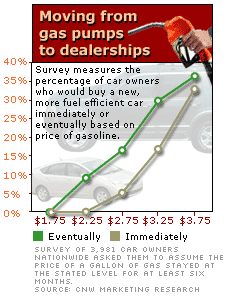NEW YORK (CNN/Money) - Even record gasoline prices haven't been enough to put the brakes on Americans' love affair with sport/utility vehicles.
For now, there's little sign that buyers are factoring gas prices into their car-buying decisions. But there are forecasts that $3 a gallon gas could be just around the corner for motorist, as soon as this summer.

Seeing that price at the pump could change buying habits said Brian Ambrose, national industry director of KPMG's automotive practice.
A shift away from SUVs would be a big blow to Detroit automakers who rely on those light trucks for much of their profits.
A survey earlier this month by CNW Marketing Research Inc. found that with gas at $1.75 a gallon, none of those surveyed said they would make either an immediate or eventual change of vehicles. But, when faced with higher hypothetical gas prices, people's attitudes begin to change.
At $2.75 a gallon, 5 percent would change their vehicle immediately and another 17 percent would change it eventually. Add another dollar to gas prices and it becomes about a third making a change immediately and another 36 percent making a change eventually, or about 70 percent making some kind of change.
A long way to go
Right now gasoline is still a long way from $3 a gallon. The AAA survey, updated every weekday, hit its sixth straight record Tuesday at $1.753. But AAA spokesman Geoff Sundstram said the auto club sees a strong possibility of $3 a gallon gas later this year.
"We may not see a national average of $3 a gallon, but I think $3 could be likely in some particular markets, particularly if we have a problem with distribution due to pipeline or refinery problems," he said. "California (with an average of $2.13) doesn't have that far to go."
| Related stories
|

|
|
|
|
Collectively, Detroit's "Big Three" automakers -- General Motors Corp., Ford Motor Co. and Chrysler Group, the North American unit of Daimler Chrysler -- sell nearly twice as many light trucks as cars, and their profits are weighted even more heavily towards the SUVs and pickups.
It was an oil shock in the early 1970s that opened the door to the lucrative U.S. market for Japanese automakers. And there's some indication that $3 gasoline could be another big boost for Asian carmakers.
They are already well positioned to benefit from a switch away from SUVs and trucks. Cars make up the majority of U.S. sales for Japanese automakers -- about 60 percent as a group.
Bumps vs plateaus
But that CNW gas price survey asked buyers to assume they would be paying the higher price for at least six months. U.S. automakers said they should be able to ride out even $3 gasoline because consumers are conditioned to temporary price hikes.
"I think what has to happen to impact sales is consumers have to come to believe that it (high gas prices) are permanent, not transitory," said George Pipas, manager of sales analysis for Ford. "Buying a vehicle is a long-term commitment -- it's not easy to get out of it tomorrow. Gas prices have spiked in some regions in recent years and we haven't seen any significant impact on sales."
What changed auto-buying habits so much in the early 1970s, Detroit automakers said, wasn't as much price as it was gas shortages brought on by price controls and rationing. When people had to wait on long lines to get gas and could only get it on alternate days, it had far greater effect on buying decisions. Even $3 a gallon gas won't cause the same shift in buying behavior this time, said Paul Ballew, GM's executive director of market and industry analysis.
States with consistently higher gas prices, such as California, don't have a significantly different mix of vehicles sold than states with traditionally lower prices, such as New Jersey, points out Ballew.
Ford's Pipas said that if rising gas prices start to influence vehicle buying decisions, an SUV or pickup buyer is more likely to look to buy a more fuel efficient vehicle of the same type than they are to shift the type of vehicle they buy.
But if that's the case, Toyota could be in a good position to capture some additional SUV sales this fall when it introduces the first SUVs powered by a combination gas-electric hybrid engine.
Click here for a look at auto stocks
While mileage totals aren't available for them yet, Toyota promises the hybrid Toyota Highlander and Lexus RX 400h SUVs will have better mileage than the typical compact car. Detroit automakers are still working on plans for their own hybrid SUVs.

|

